

FREE SHIPPING AT $150
YOU'VE EARNED FREE SHIPPING!
FREE SHIPPING AT $150
YOU'VE EARNED FREE SHIPPING!
March 26, 2024 12 min read
Adaptogens have gained significant popularity in recent years for their potential health benefits and ability to help the body adapt to stress. But what exactly are adaptogens, and how do they work?
Here, we will explore the world of adaptogens, including their sources, mechanisms of action, and potential health benefits. Whether you're curious about incorporating adaptogens into your daily fitness routine or simply want to learn more about the potential benefits of these intriguing natural remedies. This article will provide you with a comprehensive overview of adaptogens and their role in promoting overall well-being.
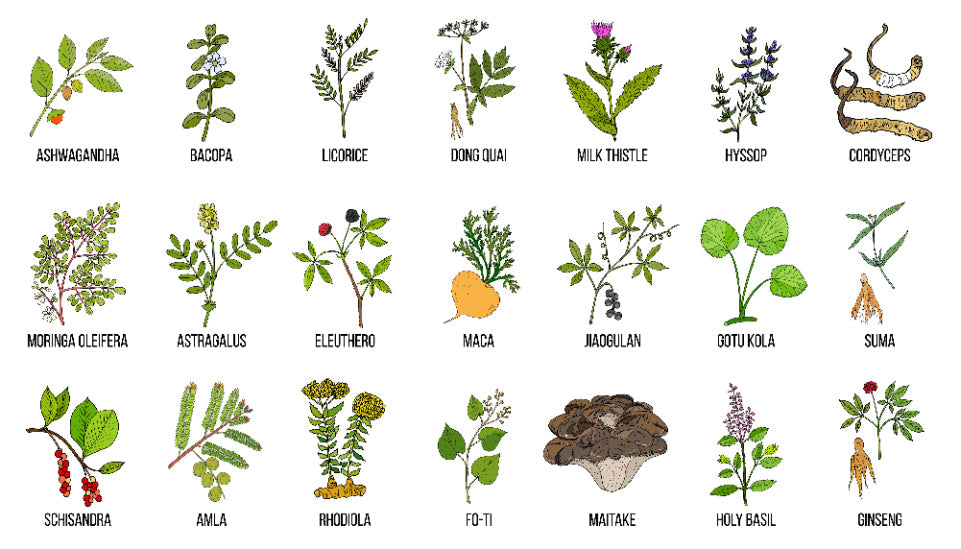
Adaptogens are a class of herbs and plants that are believed to help the body resist stressors of various kinds, whether physical, chemical, or biological.
They are thought to work by supporting the adrenal glands, which play a key role in the body's response to stress, and by helping to balance the body's physiological functions.
Experts believe that adaptogens interact with the hypothalamic-pituitary-adrenal (HPA) axis, which initiates your body's stress response and plays a big role in keeping your body in balance.
Throughout history, adaptogens have been used in traditional medicine systems around the world to help the body cope with stress and improve overall health.

In ancient Ayurvedic medicine, adaptogenic herbs like ashwagandha and holy basil were used to enhance vitality and promote longevity.
In Traditional Chinese Medicine (TCM), herbs like ginseng and Astragalus are used to strengthen the body and increase resistance to disease.
Indigenous cultures in Siberia, Tibet, and other regions also have a long history of using adaptogenic herbs to help them endure harsh environmental conditions and improve physical and mental resilience.

Reishi mushrooms, sourced from the fungus Ganoderma lucidum, have a long history of use in traditional Chinese medicine. These mushrooms have a bitter taste and are known for their potential health benefits. They are believed to support the immune system, reduce fatigue, and promote overall well-being.
Furthermore, Ganoderma lucidum, or Reishi mushrooms, have been proposed as a novel therapy that may improve cancer treatment and patients’ survival.
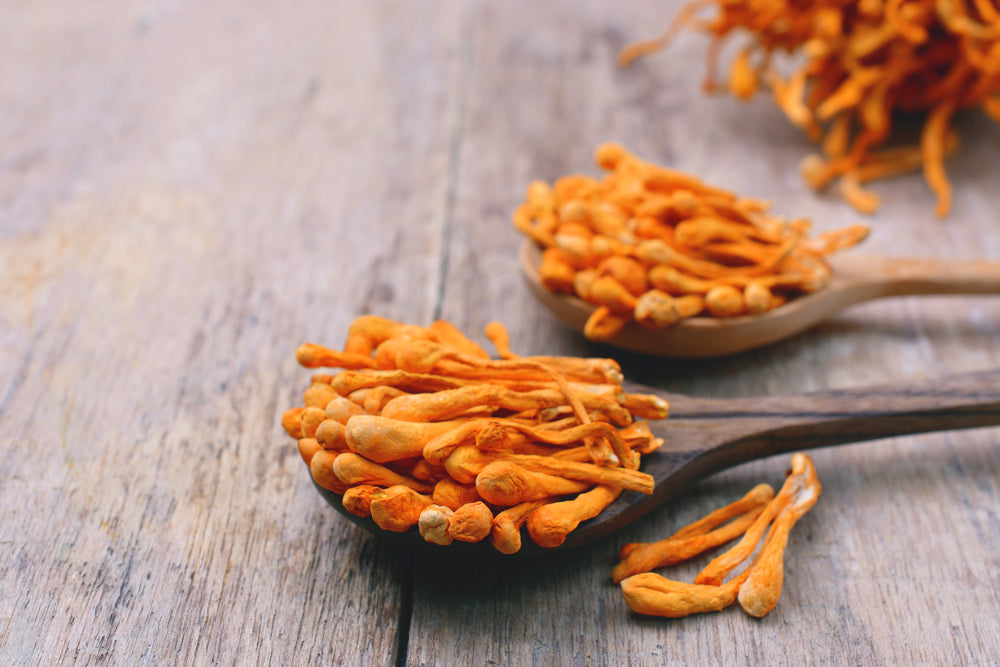
Cordyceps is a genus of fungi that grows on the larvae of caterpillars in the mountainous regions of China. It's also known as caterpillar fungus or caterpillar mushroom. It has an earthy taste and is known for its potential health benefits.
A 2014 study concluded that Cordyceps is an excellent source of bioactive metabolites with more than 21 clinically approved benefits on human health including anti-diabetic, antitumor, anti-oxidative, immunomodulatory, sexual potentiator and anti-ageing effects. Cordyceps is also believed to improve athletic performance, enhance energy levels, and boost immunity.
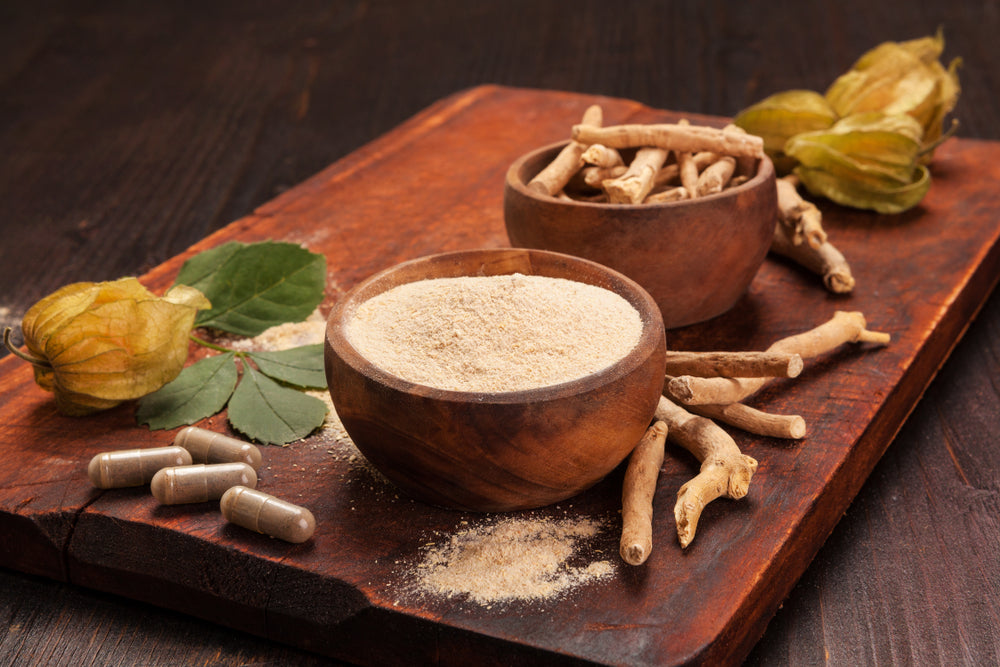
Ashwagandha, also known as Indian Ginseng, is derived from the root of the Withania somnifera plant. It has a bitter taste and is highly valued in Ayurvedic medicine for its adaptogenic properties. Ashwagandha is believed to reduce chronic stress and anxiety, improve cognitive function, and boost immunity.
Research also shows ashwagandha's calming effect helped people with insomnia or anxiety improve their sleep, and even stress-related obesity.
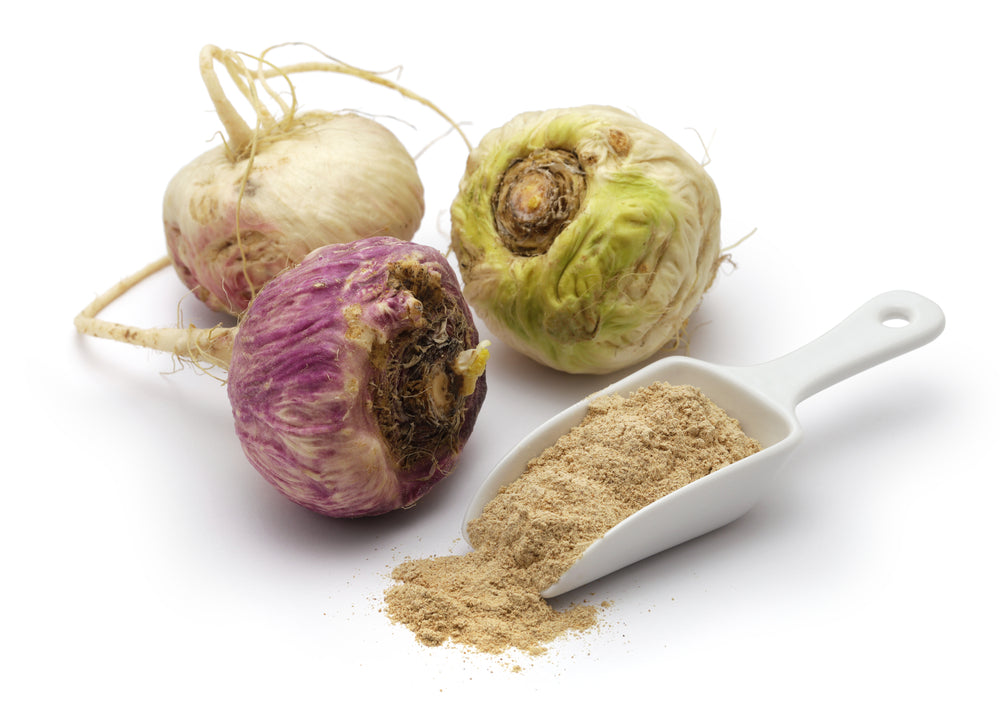
Maca root, or Peruvian Ginseng, is a plant native to the Andes Mountains of Peru. It has an earthy, nutty taste and is known for its potential health benefits. Maca is believed to increase energy and stamina, balance hormones, enhance fertility, increase sperm count, improve sexual performance, and enhance our natural detoxification process.
Overall, Maca is a plant with great potential as an adaptogen and appears to be promising as a nutraceutical in the prevention of several diseases.
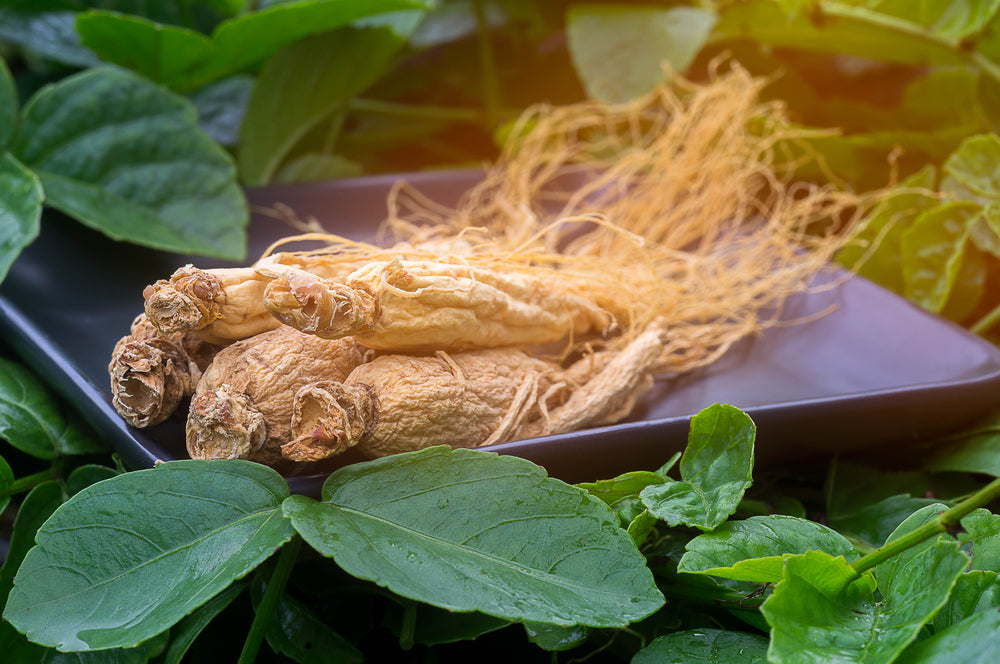
Panax Ginseng, also known as Asian Ginseng, is a root plant with a bitter taste that is native to East Asia. It has been used in traditional Chinese medicine for its potential health benefits. Panax Ginseng is believed to increase energy and reduce the severity of fatigue, improve mental clarity, and boost the immune system.
A placebo-controlled study concluded that taking ginseng can significantly reduce post-exercise muscle damage in healthy adults. Furthermore, it improves muscle regeneration and helps the body recover from both muscle fatigue and damage after physical exercise.

Siberian Ginseng, also known as Eleuthero Root, is a root plant with a bitter taste that is native to Siberia and other parts of Asia. It has been used in traditional Chinese medicine for its potential health benefits. It’s also been studied in Russia in the ’60s and ’70s.
It has different active chemical components than American ginseng and Asian ginseng, and research shows that Siberian ginseng may help with fatigue, weight reduction and support physical activity. It may also improve focus and stave off mental fatigue to help increase your cognitive function.
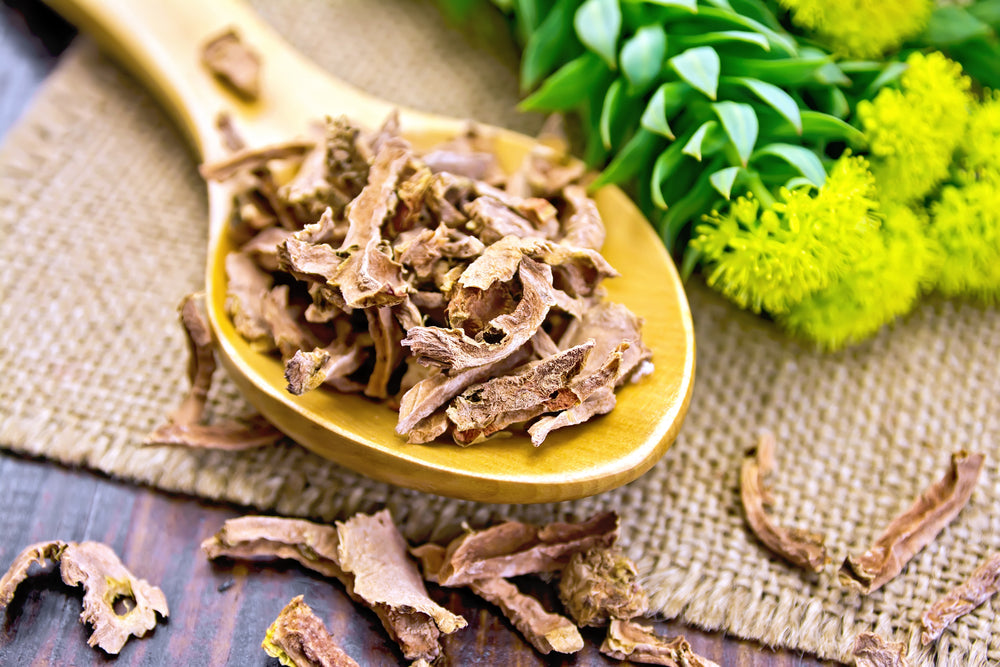
Rhodiola Rosea, also known as Arctic Root or Golden Root, is an herb native to the mountainous regions of Europe and Asia. It has a bitter taste and is known for its potential health benefits. Rhodiola is believed to increase energy, enhance physical performance, and reduce fatigue and exhaustion. Some say Rhodiola Rosea can prevent burnout and enhance recovery after exercise. Furthermore, this root can also reduce unrest, irritability and tension, and improve your mood.
According to a 2017 systematic review of stress management and the role of Rhodiola Rosea, this adaptogen was approved by the HMPC/EMA for the indication ‘stress’ and influences the release of stress hormones while boosting energy metabolism.

A popular adaptogen used in Chinese medicine for increased energy and endurance. It may also boost immunity, and protect the thymus gland from excessive cortisol damage. Licorice root has been shown to regulate cortisol levels, help prevent ulcers, and reduce oxidative stress. Licorice root also reduces high male hormone levels (androgen and testosterone) in women.
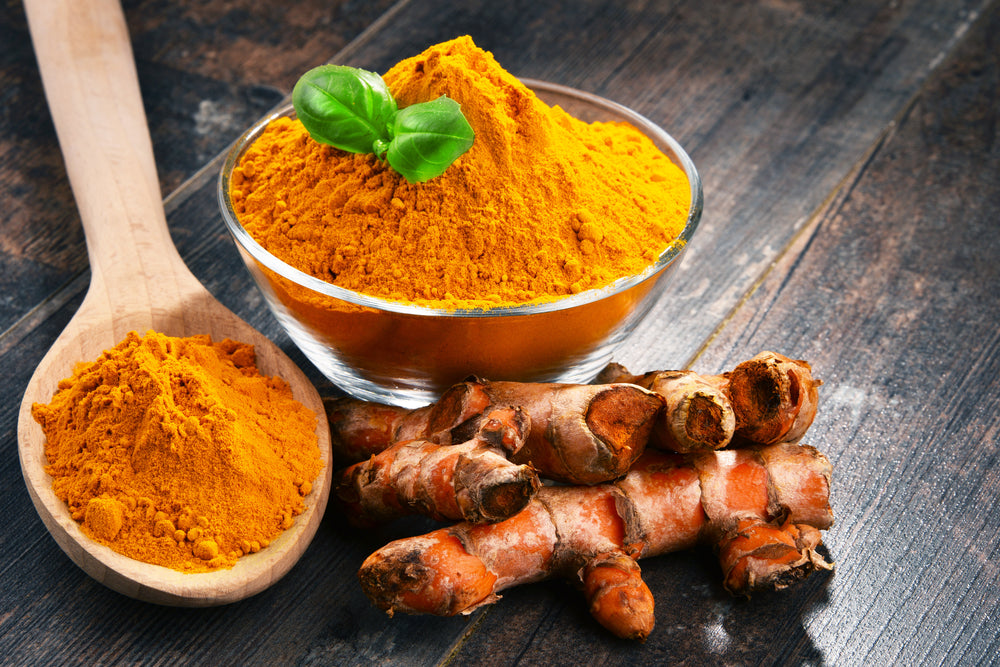
The compound in turmeric called curcumin is considered an adaptogen. Turmeric is a root plant with an earthy, slightly bitter taste that is native to India and Southeast Asia. It has been used in traditional medicine for centuries for its potential health benefits.
Turmeric is believed to have anti-inflammatory properties, support joint health, and improve digestion. The Mayo Clinic notes that it may play a role in easing symptoms of conditions like osteoarthritis, rheumatoid arthritis, and Crohn's disease.
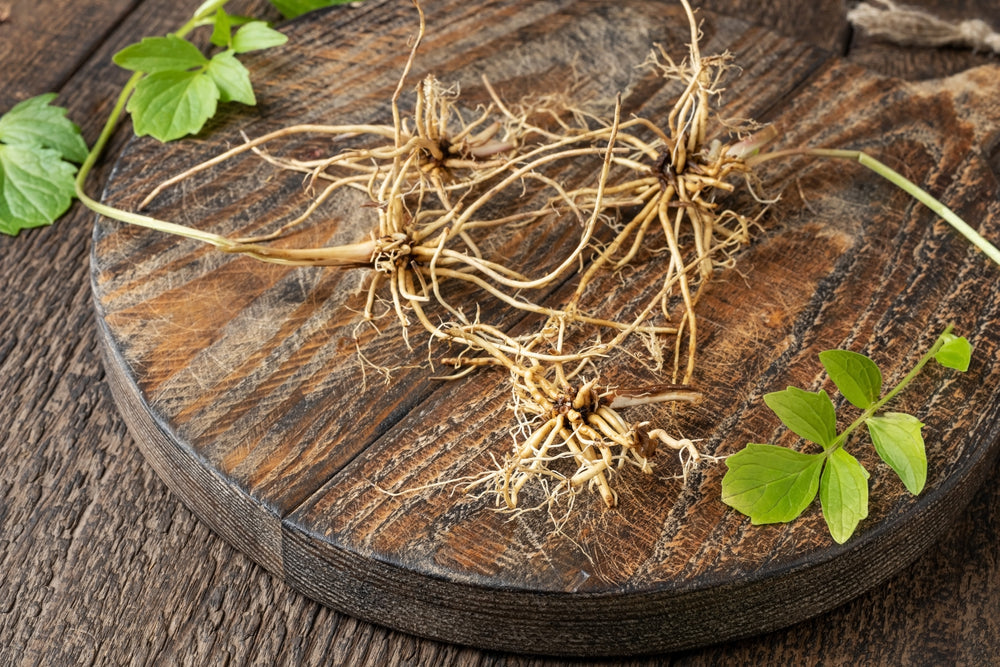
Valerian root is derived from the root of the Valeriana officinalis plant and has an earthy, pungent taste. It has been used in traditional medicine for its potential health benefits. Valerian root is believed to promote relaxation, improve sleep duration and quality, and reduce anxiety. Valerian root also contains valeric acid, which has a sedative effect.
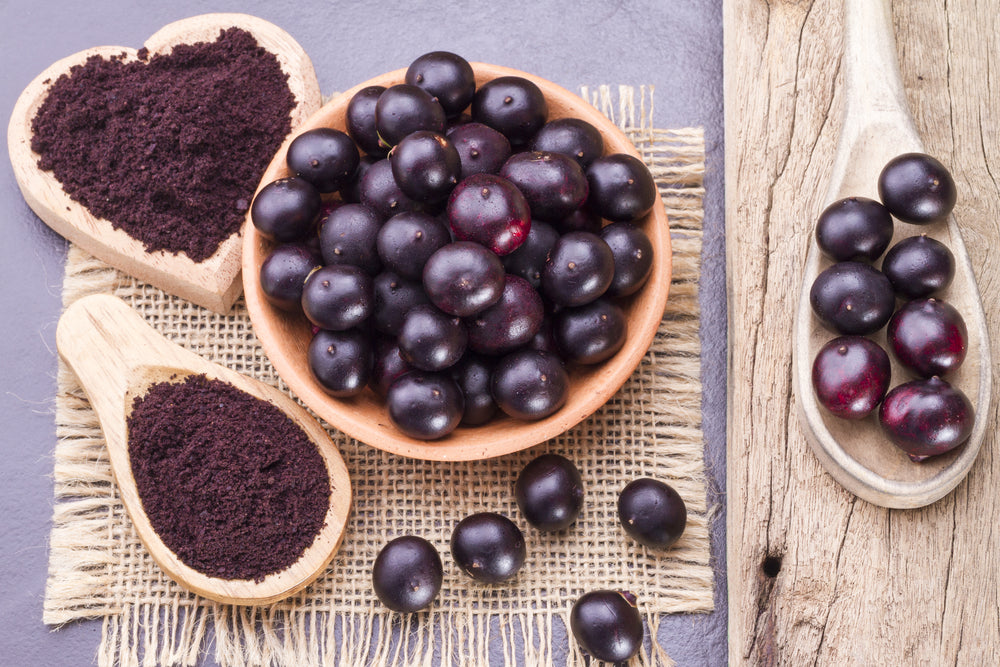
Acai berries are small, dark purple berries that grow on the acai palm tree in the Amazon rainforest. They have a sweet, slightly bitter taste and are rich in antioxidants. Acai is believed to promote heart and brain health, boost energy levels, regulate blood lipid levels, and support overall well-being.
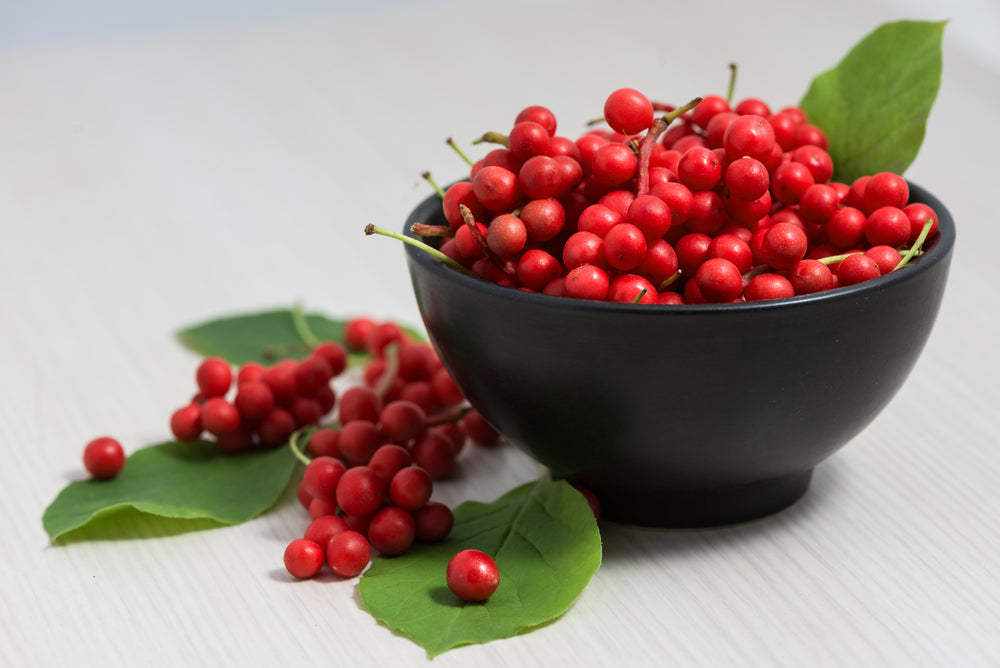
Schisandra Chinensis, also known as Five Flavor Berry, is a berry with a unique taste that includes sour, sweet, salty, bitter, and pungent flavors. that grows on a vine. It is native to China and Russia and has been used in traditional Chinese medicine for its potential health benefits.
Schisandra is believed to support liver health, reduce stress, and improve mental clarity. Schisandra chinensis research shows it may help decrease blood glucose and cortisol levels, as well as also decrease interleukin production, boost endurance, mental performance, and working capacity.
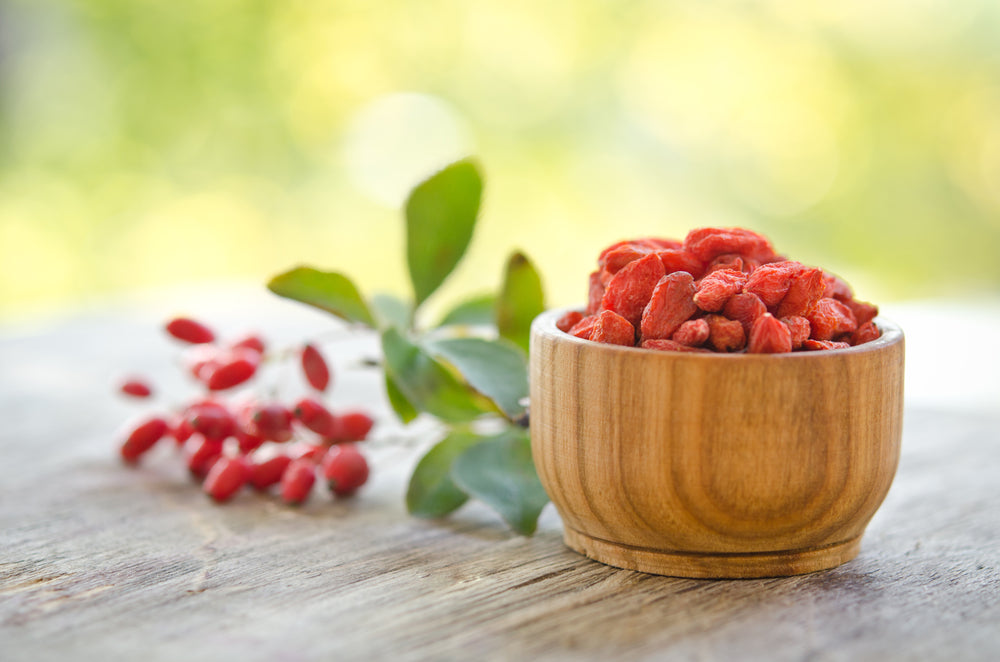
Goji berries are small, red berries that grow on the Lycium barbarum plant in China. They have a sweet taste with a slightly sour aftertaste and are rich in antioxidants. Goji berries are believed to support eye health and boost immune functions. Goji berries may also boost energy, physical and mental performance, calmness, sense of well-being, and improve sleep.

Bacopa Monniera is also known as Brahmi, water hyssop, and herb of grace. It is a herb native to India that has a bitter taste. It has been used in Ayurvedic medicine for centuries for its potential cognitive benefits. Bacopa is believed to improve memory and cognitive function, reduce anxiety, and support brain health.
Findings in a 2001 clinical trial suggest that B. monniera may improve higher-order cognitive processes that are critically dependent on the input of information from our environment, such as learning and memory.
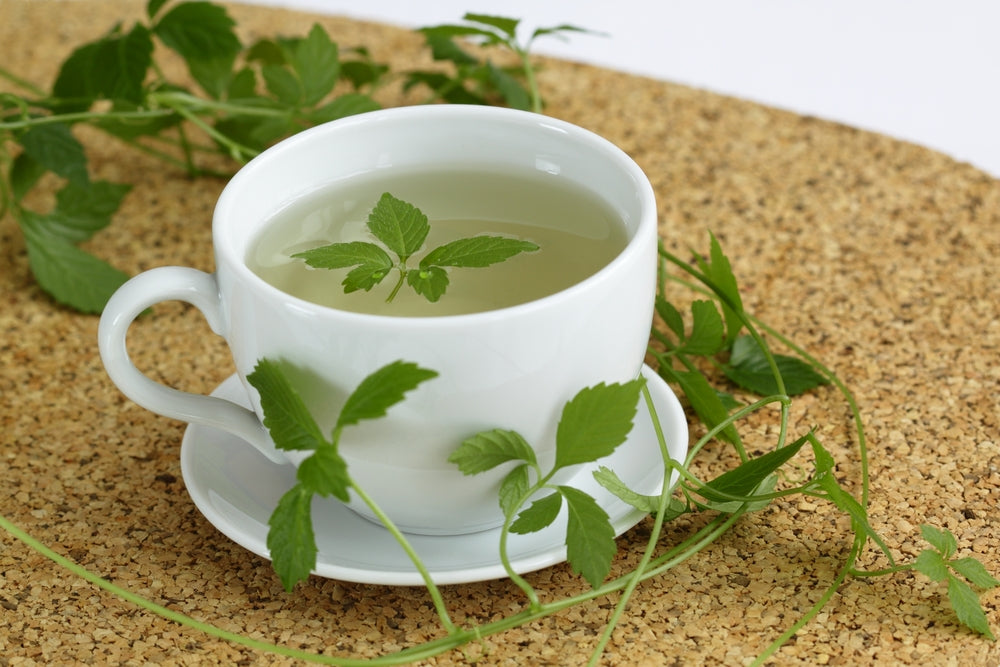
Jiaogulan, also known as Gynostemma pentaphyllum, is a herb native to China and other parts of Asia. It has a sweet taste and is known for its potential health benefits. Jiaogulan is believed to support cardiovascular health, reduce stress, and boost immunity.
According to a 2022 Food Science & Nutrition publication online, Jiaogulan has various medicinal properties such as anticancer, anti-obesity, anti-inflammation, and antioxidation.

Holy Basil, also known as Ocimum tenuiflorum and Tulsi, is an herb native to India that has a sweet, spicy taste. It is highly valued in Ayurvedic medicine for its adaptogenic properties. Holy Basil is believed to reduce mental stress, stress-related anxiety, boost immunity, and promote overall well-being.
According to a PubMed Central publication in 2017, the findings from 24 human studies published to date suggest that the Tulsi is a safe herbal intervention that may assist in normalizing glucose, blood pressure and lipid profiles, and dealing with psychological and immunological stress.
Furthermore, these studies indicate the daily addition of Tulsi to the diet or as adjunct to drug therapy can potentially assist in prevention or reduction of various health conditions and warrants further clinical evaluation.
Adaptogens are increasingly recognized in integrative medicine for their potential to complement Western medical practices. While not intended to replace conventional treatments, adaptogens are often used to fill the gaps in long-term health maintenance.
For instance, while sugar and coffee may provide short-term energy boosts, adaptogens like Ashwagandha and Rhodiola Rosea are believed to help build up the body's resilience to stress and fatigue over time.
This integrative approach aims to support overall well-being by addressing the root causes of health issues and promoting a balanced lifestyle.
By incorporating adaptogens into their routine, individuals may enhance their body's natural defenses and improve their ability to cope with everyday stressors.
Existing studies suggest that certain adaptogens may provide the following health benefits:
1. Stress and Anxiety: Adaptogens, such as Ashwagandha and Rhodiola Rosea, are thought to regulate the production of stress hormones like cortisol to calm the nervous system, helping the body respond more effectively to stress. However, they are not quick-fixes.
2. Reduce Fatigue: Some adaptogens, like Siberian Ginseng and Cordyceps, help control cortisol production, which can reduce fatigue caused by stress. These effects are gradual and may require consistent use.
3. Improve Sleep: Excessive cortisol levels, due to stress, can disrupt sleep. Adaptogens such as Valerian Root and Holy Basil may help maintain a normal sleep cycle, but they are not overnight solutions.
4. Energy Production: Adaptogens like Maca Root and Panax Ginseng are believed to support energy production in the body, which can improve overall vitality and reduce fatigue. However, their effects may take time to be noticeable.
5. Reduce Inflammation: Adaptogens have anti-inflammatory properties. Turmeric, included in many adaptogenic blends, may reduce inflammatory pain related to conditions like fibromyalgia, osteoarthritis, and rheumatoid arthritis, but consistent use is key.
6. Immune System Support: Adaptogens, including Astragalus and Reishi Mushrooms, are thought to have immune-modulating effects, helping to regulate the immune system's response to stress and other challenges. However, they are not a substitute for medical treatment.
7. Antioxidant Properties: Many adaptogens are rich in antioxidants, such as Acai and Goji Berry, which can help protect cells from damage caused by free radicals and oxidative stress. Incorporating these into your diet can contribute to overall health, but they are not cure-alls.
8. Neuroprotective Effects: Some adaptogens, like Bacopa Monniera and Jiaogulan, are believed to have neuroprotective effects, supporting brain health and cognitive function. They may influence the neuroendocrine system, which promotes healthy body functioning, but results are gradual and may vary.
9. Reduce Cancer Risks: Plant-based adaptogens, with their antioxidant and immune-supportive properties, have been studied for their potential to reduce the risks of certain cancers. However, their role in cancer prevention is not yet fully understood, and they should not be relied upon as the sole preventive measure.
Examples of evidence-based studies that have proven the potential benefits of adaptogens include one that compared ginseng-like herbs used worldwide with traditional Chinese medicine (TCM).
Many have reported potential benefits for:
— Stress
— Sleep
— Arthritis
— Cancer
— Neuroendocrine
Another study examined the history and future perspectives of plant adaptogens, focussing on benefits for:
— Mental health
— Physical endurance
— Fatigue
— High cholesterol
— Blood sugar control
— Hormone imbalance
— Hot flashes
— and more.
While some adaptogens have been subjects of more studies than others, research is ongoing.

Synthetic adaptogens are artificially created compounds designed to have similar effects to natural adaptogens. While they may mimic some properties of natural adaptogens, there is ongoing debate about their safety and efficacy compared to natural sources.
Examples of synthetic adaptogens include:
— aphobazole
— bemethyl
— bromantane
— levamisole
Synthetic adaptogens are claimed to boost mental and physical health, increase blood flow by expanding the blood vessels, and lower levels of sugar and lactate in the blood.
Supplements, including adaptogens, are not subject to regulation by the Food and Drug Administration (FDA) in terms of safety or efficacy. This leaves it up to the consumer to ensure that they are purchasing pure and safe products.
The regulation of synthetic adaptogens by the FDA can vary depending on how they are classified. If they are considered dietary supplements, they fall under the regulation of the Dietary Supplement Health and Education Act (DSHEA) in the United States.
Under DSHEA, manufacturers are responsible for ensuring the safety of their products, and the FDA can take action if there are safety concerns or if a product is misbranded or adulterated.
Many athletes used to take synthetic adaptogens to help boost their stamina. However, some such supplements are now banned substances for athletes. The use of synthetic adaptogens or any other supplements is governed by the rules of the respective sports organizations.
Many sports organizations, including the World Anti-Doping Agency (WADA) and the United States Anti-Doping Agency (USADA), have strict rules regarding the use of substances that could potentially enhance performance, including certain supplements.
Athletes are advised to check the rules of their sport and consult a healthcare professional before using any supplements, including synthetic adaptogens.
Adding adaptogens to your health regime or diet can be a beneficial way to support overall well-being.
Here are some tips on how to incorporate adaptogens into your routine:
Start Slowly: If you're new to adaptogens, start with one or two types to see how your body responds.
Choose Quality Products: Look for reputable brands that source high-quality adaptogens to ensure you're getting the best possible benefits.
Consult a Healthcare Professional: Before adding adaptogens to your routine, especially if you have any health conditions or are taking medication, it's a good idea to consult a healthcare professional to ensure they're safe for you.
Consider Your Needs: Different adaptogens have different effects, so consider what you're looking to achieve. For example, if you're looking for stress relief, you might consider adaptogens like Ashwagandha or Rhodiola Rosea. If you're looking to boost energy, you might consider adaptogens like Maca or Ginseng.
Incorporate into Your Diet: Adaptogens can be taken in various forms, including capsules, powders, and tinctures. You can add adaptogenic powders to smoothies, coffee, or tea, or take them in capsule form with meals.
Be Consistent: Like many supplements, adaptogens may take time to build up in your system and produce noticeable effects. Consistency is key to experiencing their full benefits.
Monitor Your Body: Pay attention to how your body responds to adaptogens. If you experience any negative side effects, discontinue use and consult a healthcare professional.
Adjust as Needed: As your body adapts, you may find that you need to adjust your dosage or the types of adaptogens you're taking. Listen to your body and make changes as needed.
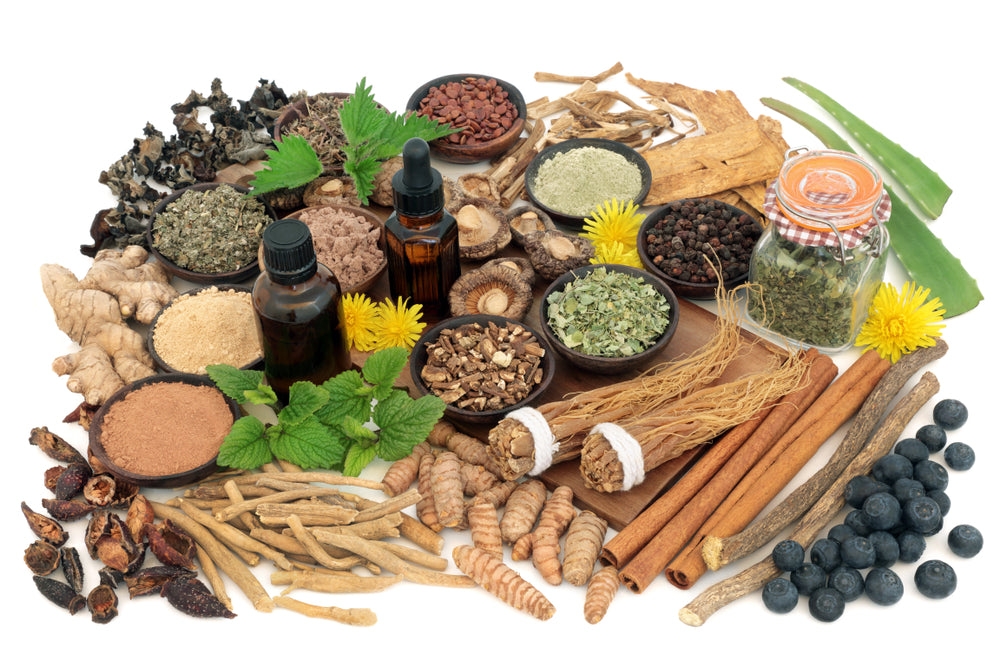
By incorporating adaptogens into your health regime or diet in a thoughtful and informed way, you can potentially support your body's natural ability to adapt to stress and promote overall well-being.
While adaptogens are generally considered safe for most people when taken as directed, there are some potential risks and side effects to be aware of:
— Allergic Reactions: Some people may be allergic to certain adaptogens, so it's important to monitor for any signs of an allergic reaction, such as itching, swelling, or difficulty breathing.
— Interactions with Medications: Adaptogens can interact with certain medications, such as blood thinners, diabetes medications, and immunosuppressants. If you're taking any medications, it's important to consult a healthcare professional before adding adaptogens to your routine.
— Digestive Issues: Some people may experience digestive issues, such as stomach upset, nausea, or diarrhea, when taking adaptogens. Starting with a lower dose and gradually increasing it can help reduce the risk of digestive issues.
— Insomnia: Certain adaptogens, such as Panax Ginseng, may cause insomnia or sleep disturbances in some people. It's best to avoid taking stimulating adaptogens close to bedtime.
— Hormonal Effects: Some adaptogens, such as Maca Root, may have hormonal effects and should be used with caution, especially in individuals with hormone-sensitive conditions like breast cancer or endometriosis.
— Pregnancy and Breastfeeding: Pregnant or breastfeeding women should consult a healthcare professional before taking adaptogens, as their safety during these times is not well-studied.
— Quality and Purity: Ensure you are purchasing high-quality, pure adaptogen products to reduce the risk of contamination or adulteration.
— Individual Sensitivity: Everyone's body reacts differently to supplements, so what works well for one person may not work the same for another. Pay attention to how your body responds, and adjust your dosage or choice of adaptogen accordingly.
As with any supplement and herbal medicines, it's important to use adaptogens responsibly and consult a healthcare professional if you have any concerns or experience any negative side effects.
In conclusion, adaptogens are a fascinating class of herbs and plants that have been used for centuries in traditional medicine systems around the world. Their ability to help manage the body’s stress response and promote overall health and well-being makes them a valuable addition to any wellness routine.
While more research is needed to fully understand how adaptogens work, and their potential health benefits, many people report positive effects from incorporating these natural remedies into their daily lives.
Whether you're looking to reduce the effects of stress, improve energy levels, or support your immune system, adaptogens offer a natural and holistic approach to health and wellness.
